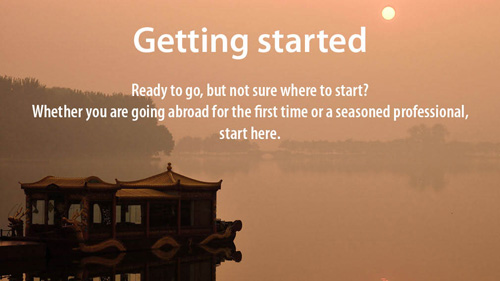Determining the health and safety conditions and challenges for your destination should be done early on in your planning process. This can be accomplished through a combination of online research, discussion with former participants and advice from trained professionals. Your sending or host organization should also be a valuable source of current information.
Vaccinations
Depending on where you plan to travel, you may be at risk for vaccine-preventable illnesses. You can get a good idea of what vaccinations are required and recommended from the the Center for Disease Control or the Public Health Agency of Canada, but making an appointment with a travel health clinic is always a good idea. They will make sure you are up-to-date on your standard immunizations, and assess your specific needs based on where you are travelling and your planned activities. Sometimes different locations (or even seasons) within the same country have different risks.
Some vaccines, such as yellow fever, are required for entry into certain countries, while others are recommended. When it comes to health and safety, we recommend you err on the side of caution. Your health provider will be the best source of information about your specific situation and may recommend other preventative medicine, such as malaria pills, in addition to routine vaccinations. Set up an appointment at least six weeks prior to your departure as some vaccines require a few weeks to take effect.
Travel Health
It’s important to make sure you are in good health before you leave for your volunteer experience. Consider making check-up appointments with your doctor and dentist before you leave. If you need prescription medication, ensure you have enough to last the length of your trip and keep it in its original packaging to avoid any issues when crossing borders.
If you wear glasses or contact lenses, you might want to pack an extra pair as it can be difficult and expensive to replace them while you are abroad. A travel health kit is also a good idea to bring to deal with many of the minor issues you may face while living in a foreign country—insect bites, diarrhea, sunburns and other irritants. This is especially important if you will be living or travelling away from major city centres.
Contaminated water and food are some of the most common causes of illness in travellers. Before you arrive, determine if you can drink the tap water. If not, be sure to use safe bottled water for teeth brushing and keep your mouth closed in the shower! Check with your host organization for tips on clean eating establishments and safe brands of bottled water.
General Risk Management
When travelling, living or volunteering in a new place, it’s important to exercise caution as you are getting used to your surroundings. New countries have different customs and novel risks. It’s important to prepare yourself prior to your departure by reviewing the steps below, but the best advice we have is to use common sense and trust your gut. If you wouldn’t do something that feels risky at home, don’t do it abroad.
Government Registration
Before you leave, it’s a good idea to register your trip with your home government. In Canada this is done through ROCA (registration of Canadians abroad) and in the United States through STEP (Smart Traveler Enrollment Program). You can do this online and it will let your home country know where you are and allow them to contact you and provide support in case of an emergency or crisis in the country.
Travel Reports and Warnings
Research any travel reports or warnings that may have been issued for your host country. Many government websites offer the option to sign up for email travel warning updates. For example, these are available through the US Smart Traveler Enrolment Program and the Government of Canada website. These reports usually offer a wealth of information on safety and security, local laws and customs, entry requirements, health conditions and other important travel issues. Be aware that elections, demonstrations or large-scale events, particularly those that are political in nature, may present added risk and extra caution should be exercised.
Organizational policies and guidelines
If you are volunteering or studying through a reputable organization, they will usually provide some type of health and safety guidelines. Some may be general and apply to all participants across the organization and others specific to your specific project location. Review these carefully in advance, and ask questions if anything is unclear. Topics such as responsible drug and alcohol use, risk management, emergency procedures, travel (especially after dark) and clothing suggestions may be covered.
Important documents
Before you leave, you should organize all of your important documents, including the address and contact number(s) of your local contact(s) and organization. Scan all of your documents and make a couple of copies of everything and leave one set at home with a trusted friend or family member who you can reach from overseas and bring another with you. Consider how you will keep the originals and copies separate. Carry all your valuables and contact information with you on the plane. It may also be a wise idea to note the contact information and location of your closest embassy prior to your departure.
Add to Favorites


